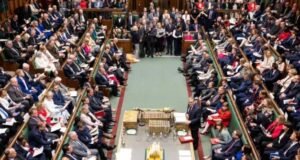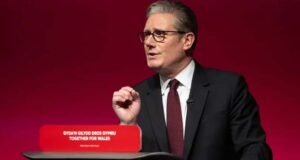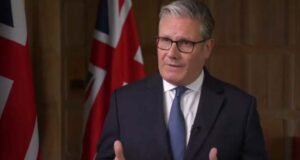Labour leader outlines UK-first approach as he set out plans for reviving Britain’s industrial base after Brexit
Government manufacturing contracts should be awarded where possible to UK companies, Jeremy Corbyn has argued, as he outlined Labour’s plans for reviving Britain’s industrial base following Brexit.
In a speech to business leaders in Birmingham which at times veered close to advocating protectionist ideas, the Labour leader called for a UK-first approach to government contracts, as well as investment in infrastructure and skills to support manufacturing.
Dismissing as “magical thinking” the decades of government policy which tended to favour growth in service industries rather than industry, Corbyn said the banking crash had shown this was not a reliable economic support.
Answering questions after the speech to the EEF manufacturers’ organisation, Corbyn dismissed the idea he was being protectionist, or even coming close to Donald Trump’s economic policies.
“It’s not economic nationalism, it’s good sense to invest in the skills that we’ve already got here, and to improve those skills for the future,” he said.
Corbyn added: “Nobody’s ever said I have something in common with Donald Trump before. It’s news to both of us, I suspect.”
In his speech, Corbyn said a future Labour government would ensure the state “uses more of its own money to buy here in Britain”.
“The state spends over £200bn per year in the private sector,” he said. “That spending power alone gives us levers to stimulate industry, to encourage business to act in people’s interests by encouraging genuine enterprise, fairness, cutting-edge investment, high-quality service and doing right by communities.
“But to ensure prosperity here we must be supporting our industries, making sure that where possible the government is backing our industries and not merely overseeing their decline.”
The Labour leader cited examples such as the decision to choose a Franco-Dutch company to print the new British passports, and the manufacture abroad of much of the rail rolling stock used in the UK.
“We have plenty of capacity to build train carriages in the UK and yet repeatedly over recent years these contracts have been farmed out abroad, costing our economy crucial investment, jobs for workers and tax revenues,” he said.
In combination with this, Corbyn said, Labour would seek to reduce the number of government contracts outsourced to private firms, “ending the racket of outsourcing that has turned our public services into a cash cow for the few”.
Answering questions, Corbyn declined to day whether Brexit would make such policies easier, given EU regulations. But he did say that for many the referendum vote had been “a cry from people saying they felt left behind in many of their communities”.
He added: “Are we promoting economic nationalism? No, what we’re promoting is an investment in manufacturing in this country.”
Corbyn also condemned the government’s Brexit plans as chaotic, accusing Theresa May of being under the control of the likes of Jacob Rees-Mogg.
“Never before has a prime minister discarded the interests of the country so recklessly in favour of the interests of their own party or their own self-preservation,” he said.
Corbyn also called for urgent action to keep the UK in some form of customs union, saying: “It’s not often that the Labour party and the Institute of Directors, the CBI and the TUC agree – we need to negotiate a new customs union.”
 Weekly Bangla Mirror | Bangla Mirror, Bangladeshi news in UK, bangla mirror news
Weekly Bangla Mirror | Bangla Mirror, Bangladeshi news in UK, bangla mirror news







